Affiliate links on Android Authority may earn us a commission. Learn more.
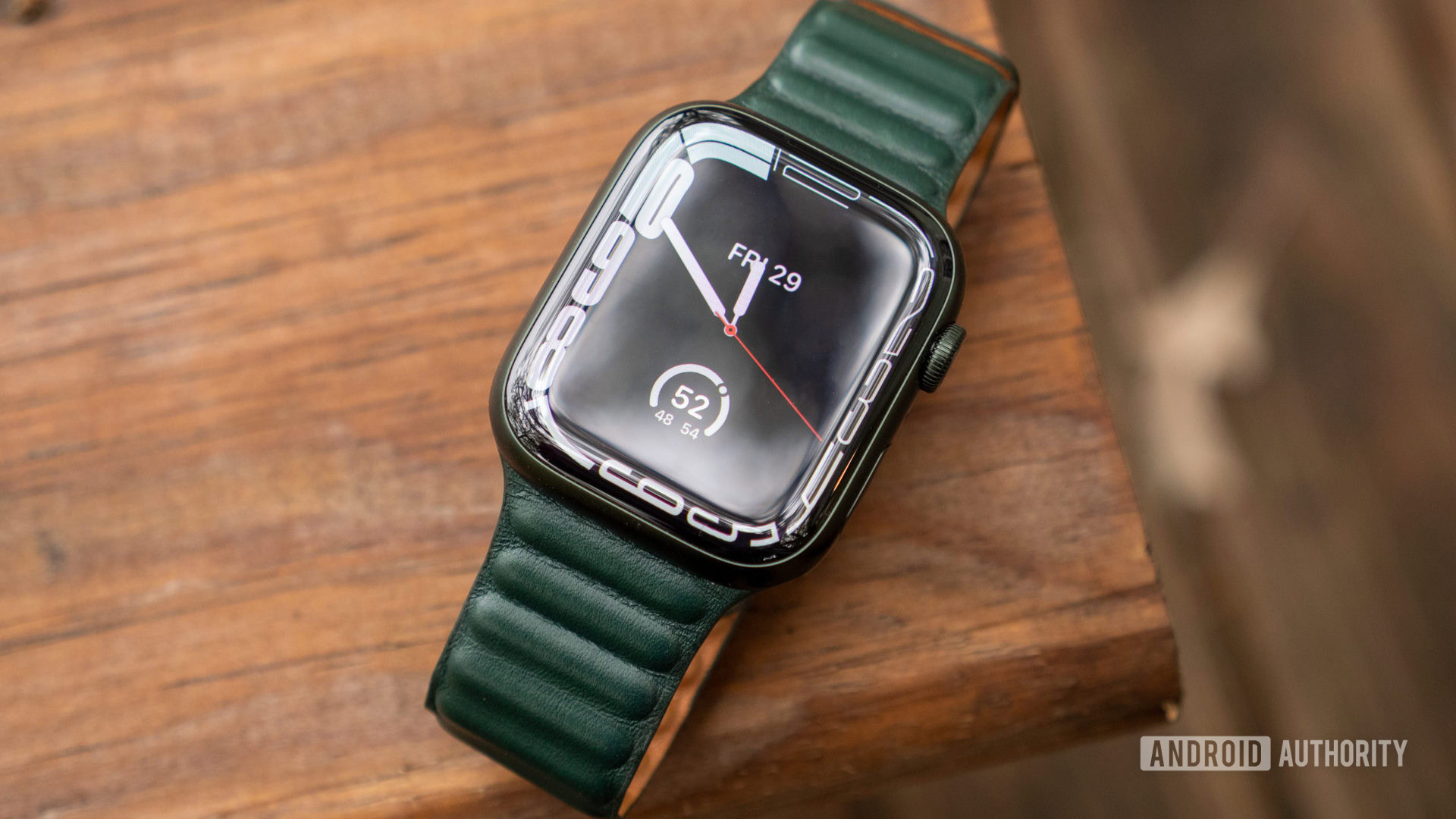
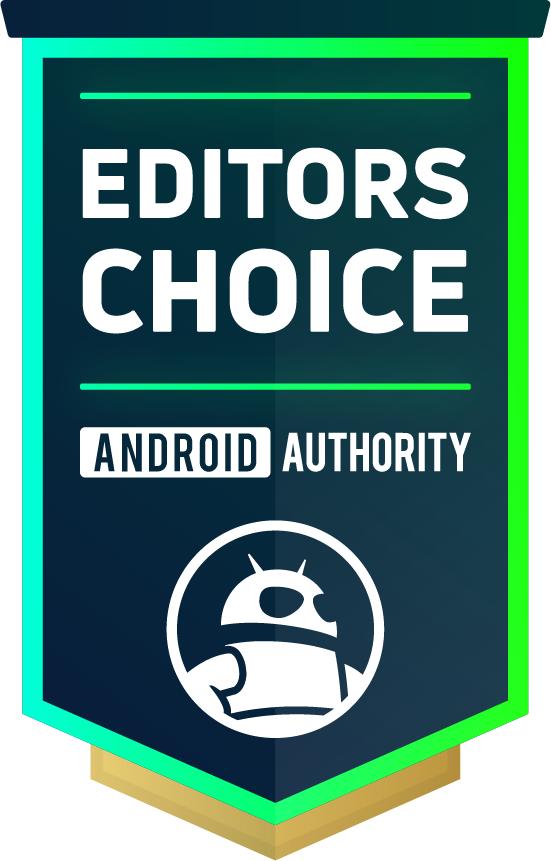
Apple Watch Series 7 review: Now an even better value

Apple Watch Series 7
MSRP:
What we like
What we don't like

Apple Watch Series 7
The Apple Watch Series 7 isn’t the significant design overhaul many were expecting; it’s a small, functional upgrade over 2020’s excellent Series 6 smartwatch. But with Wear OS back in the smartwatch game, are safe choice a wise decision for Apple? Find out in our full Apple Watch Series 7 review.


Update: Nov 2022: We have updated this Apple Watch Series 7 review with details on the software updates to date, including watchOS 9, and more.
What you need to know about the Apple Watch Series 7
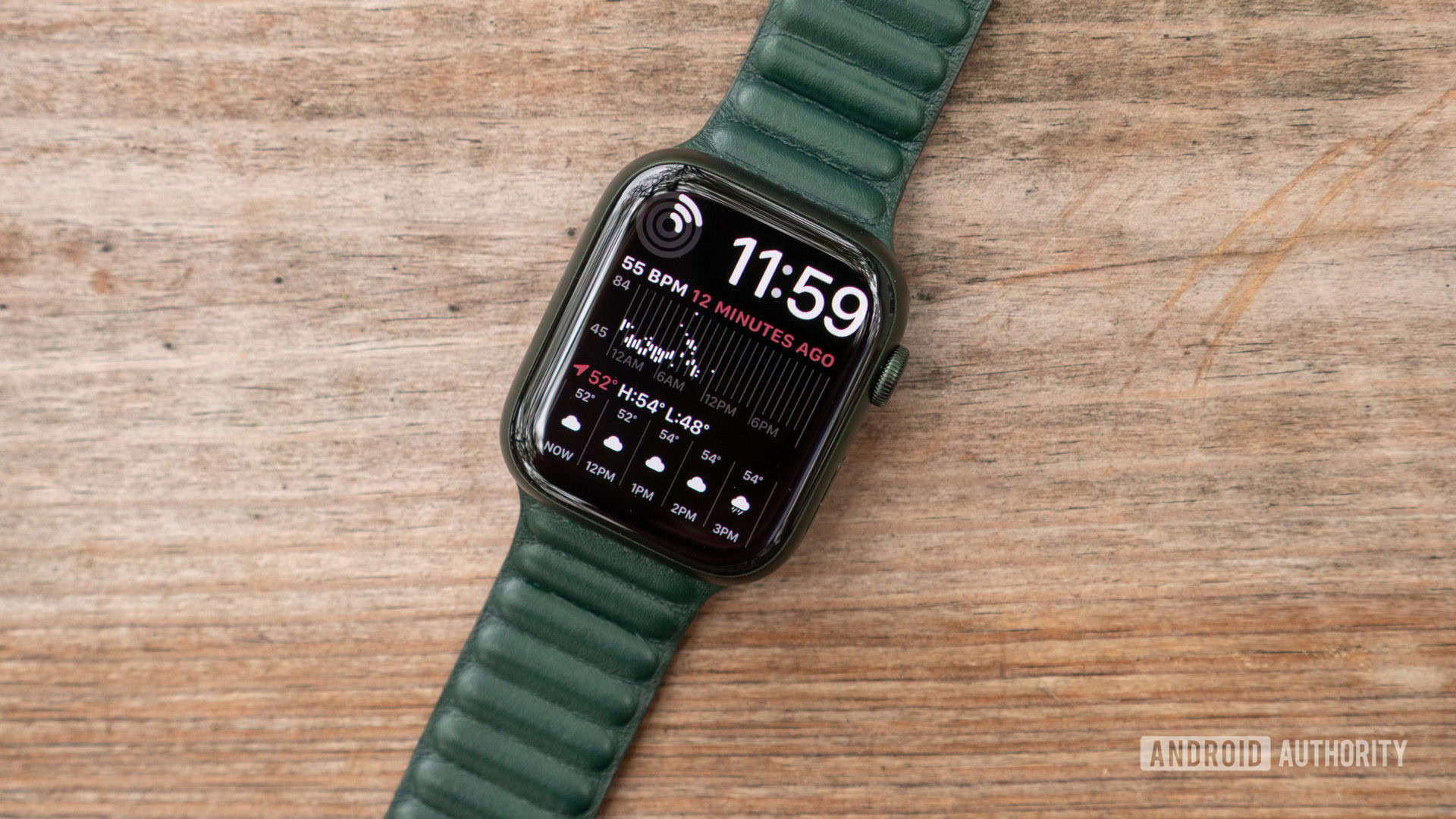
- Apple Watch Series 7 (41mm, aluminum, BT): $399 / £369 / €429
- Apple Watch Series 7 (45mm, aluminum, BT): $429 / £399 / €459
- Apple Watch Series 7 (41mm, aluminum, LTE): $499 / £469 / €529
- Apple Watch Series 7 (45mm, aluminum, LTE): $529 / £499 / €559
- Apple Watch Series 7 (41mm, stainless steel, BT): $699 / £599 / €729
- Apple Watch Series 7 (45mm, stainless steel, BT): $749 / £649 / €779
- Apple Watch Series 7 (41mm, titanium, BT): $799 / £699 / €829
- Apple Watch Series 7 (45mm, titanium, BT): $849 / £749 / €879
The Apple Watch Series 7 no longer represents the best smartwatch the company has to offer. That honor now belongs to Apple Watch Series 8. However, the Series 7 is bigger, brighter, and better-looking than its predecessor and is still a wearable worth considering. Plus, it can now be found on sale.
Compared to the Series 6, the Apple Watch Series 7’s display is bigger, the case is rounder, and the battery charges faster. It also features an on-screen keyboard, more workout modes, and automatic cycling detection plus plenty more updates via WatchOS 9. The watch is available in five aluminum case finishes; Midnight, Starlight, green (our Apple Watch Series 7 review unit), blue, and Product Red. And no, you cannot pair the Apple Watch with an Android phone — check out our guide below for Android-friendly wearables!
At launch, pricing for the baseline Series 7 started at $399 with the top-tier titanium model going up to $849. However, as mentioned, the device can now be found for reduced prices in light of a newer model being available. You can buy an Apple Watch Series 7 from Amazon, big-box retailers, and many other outlets across a wide range of global markets.
Design: All about the display
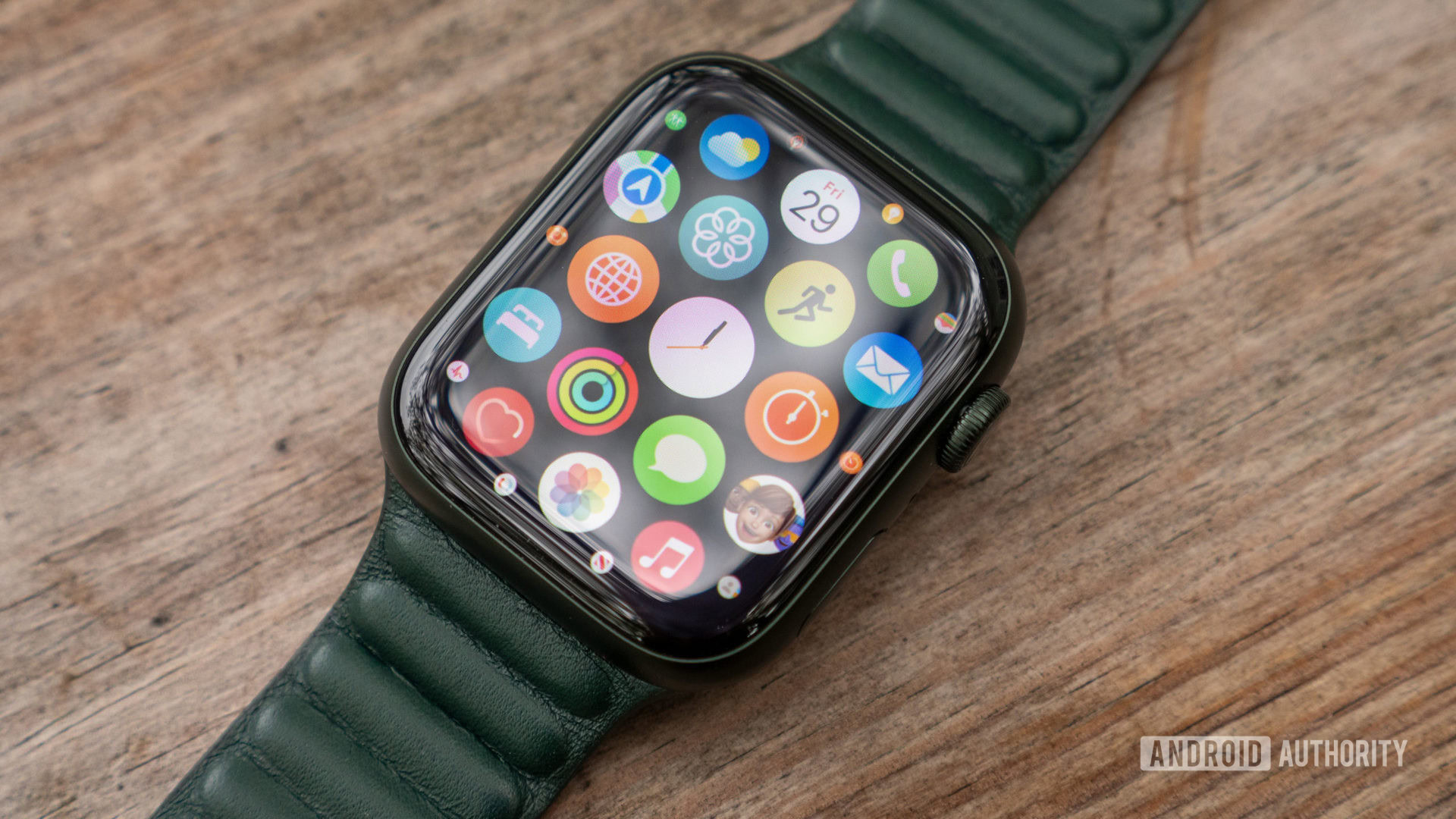
After a bunch of leaks leading up to the Apple Watch Series 7 launch, we expected a completely redesigned case for the smartwatch. Rumors claimed the Series 7 would be boxier and have sharper angles than any other Apple Watch in the past and closely echo the design of newer iPhones. That’s actually the opposite of what we got with the Series 7.
The Apple Watch Series 7 is bigger and rounder than its predecessor. It has rounded corners and a case that looks like the Series 6, save for one aspect: the Retina display. Apple increased the screen size on the Series 7 by about 20%, and it shows.
The Series 7’s display is big. It reaches the very edge of the watch casing and even curves down a bit, giving it a slight waterfall effect. If you’re after hard numbers, Apple says the bezels are just 1.7mm thick, or about 40% smaller than what you’d find on the Series 6.
I would change nothing about the Apple Watch Series 7’s display. It’s bright, responsive, and gets plenty dim in low-light settings. Peak brightness on the Series 7 is unchanged from the Series 6, so you won’t notice a difference while outdoors in direct sunlight. When the always-on display is in ambient mode — like when your wrist is down and you’re indoors — Apple says the display is 70% brighter than the Series 6. I wouldn’t say it appears 70% brighter, but I can notice a difference when comparing the two side by side. Honestly, though, this is not something you’d see if you just picked up a Series 7 by itself.
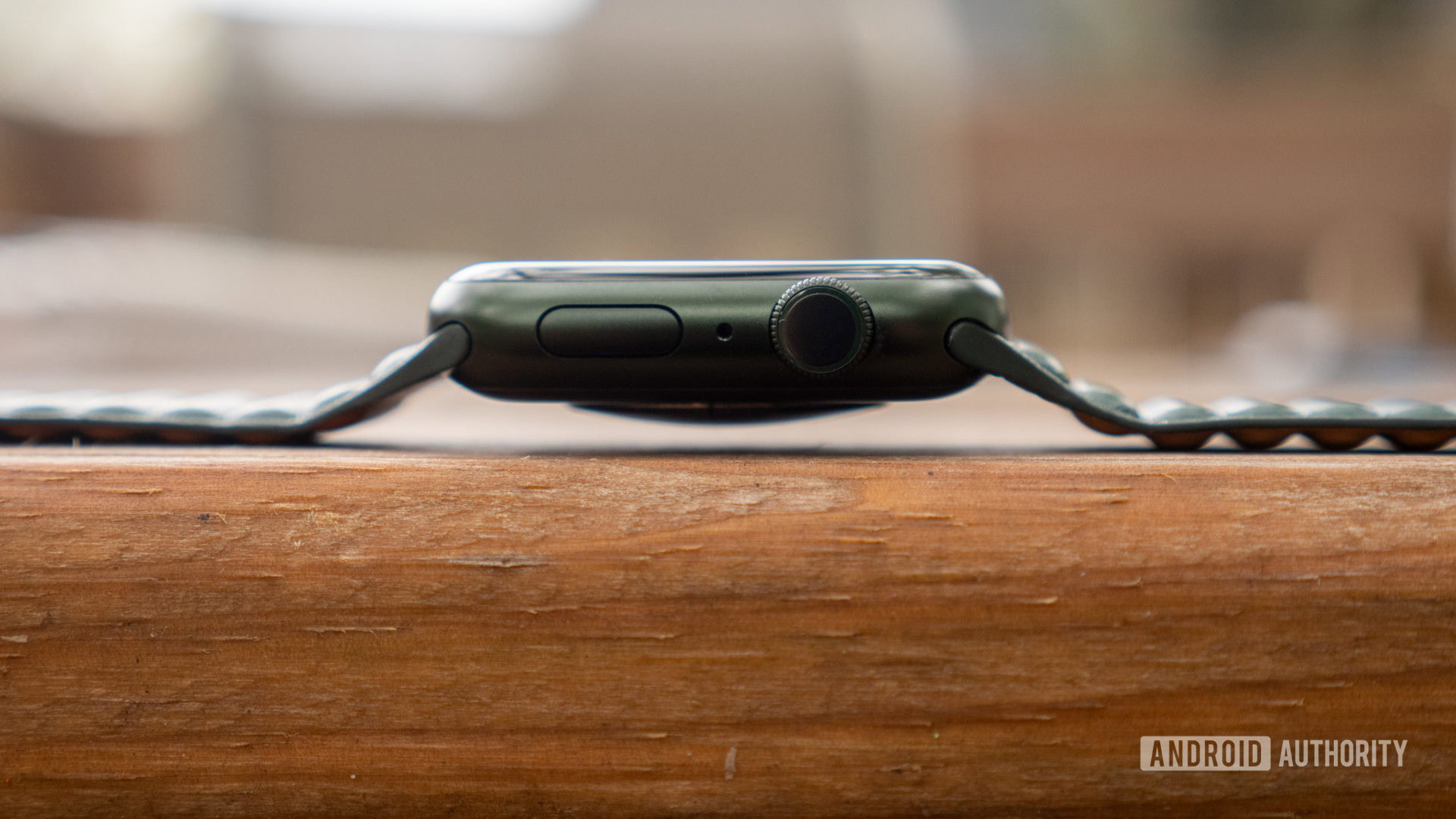
It’s not just the display that’s larger — Apple also says the crystal on top of the display is over 50% thicker than on the Series 6. This should provide more crack resistance, though I haven’t been brave enough to test the display’s durability. I’ll take Apple’s word for it in this case as the Apple Watch has always been a durable wearable. Speaking of durability, the Apple Watch Series 7 now comes with a dust resistance rating of IP6X, in addition to its WR50 water resistance rating.
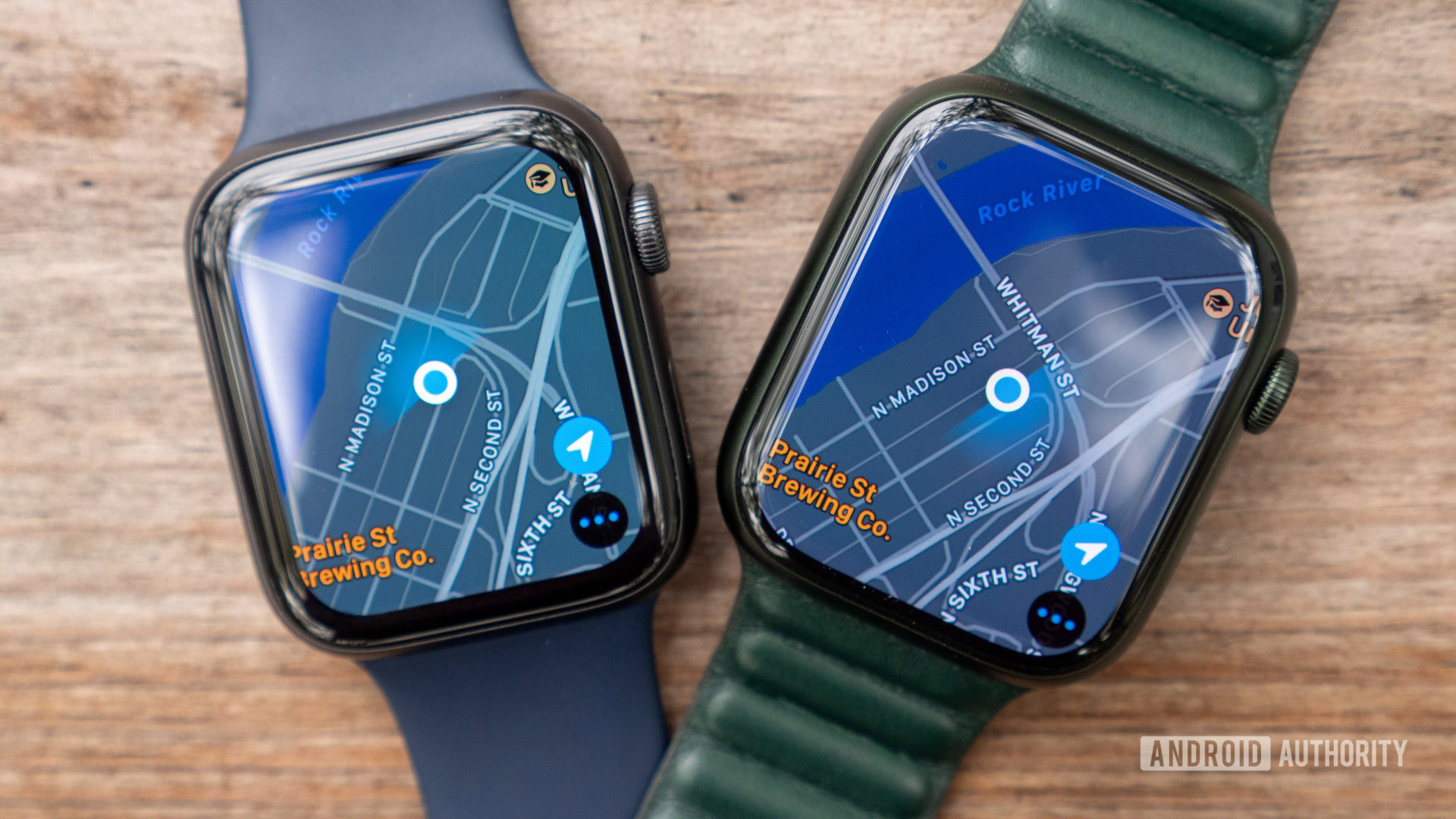
Thanks to the larger display, there’s more physical room for text and other items on each screen. You can especially notice the increased screen real estate in apps like Apple Maps, various screens in the settings menus, and on the new watch faces Apple added.
I particularly like the Modular Duo face, which shows two larger widgets that take advantage of the larger screen. The Contour face is also sleek, showing curved, thin numbers around the sides of the display. The Portraits face hides the time and date behind your selected portrait-mode photos (kinda cool), and the World Time face shows the time in all 24 time zones at once. It’s a little too busy for my liking, and I don’t think it displays well on a screen this size.
The case design has received a minor update, too. The corners of the case are softer and more rounded than on the Series 6. Again, it’s something you might not even notice unless you had two Apple Watches side by side. The case is a bit bigger, though, but only by about 1mm.
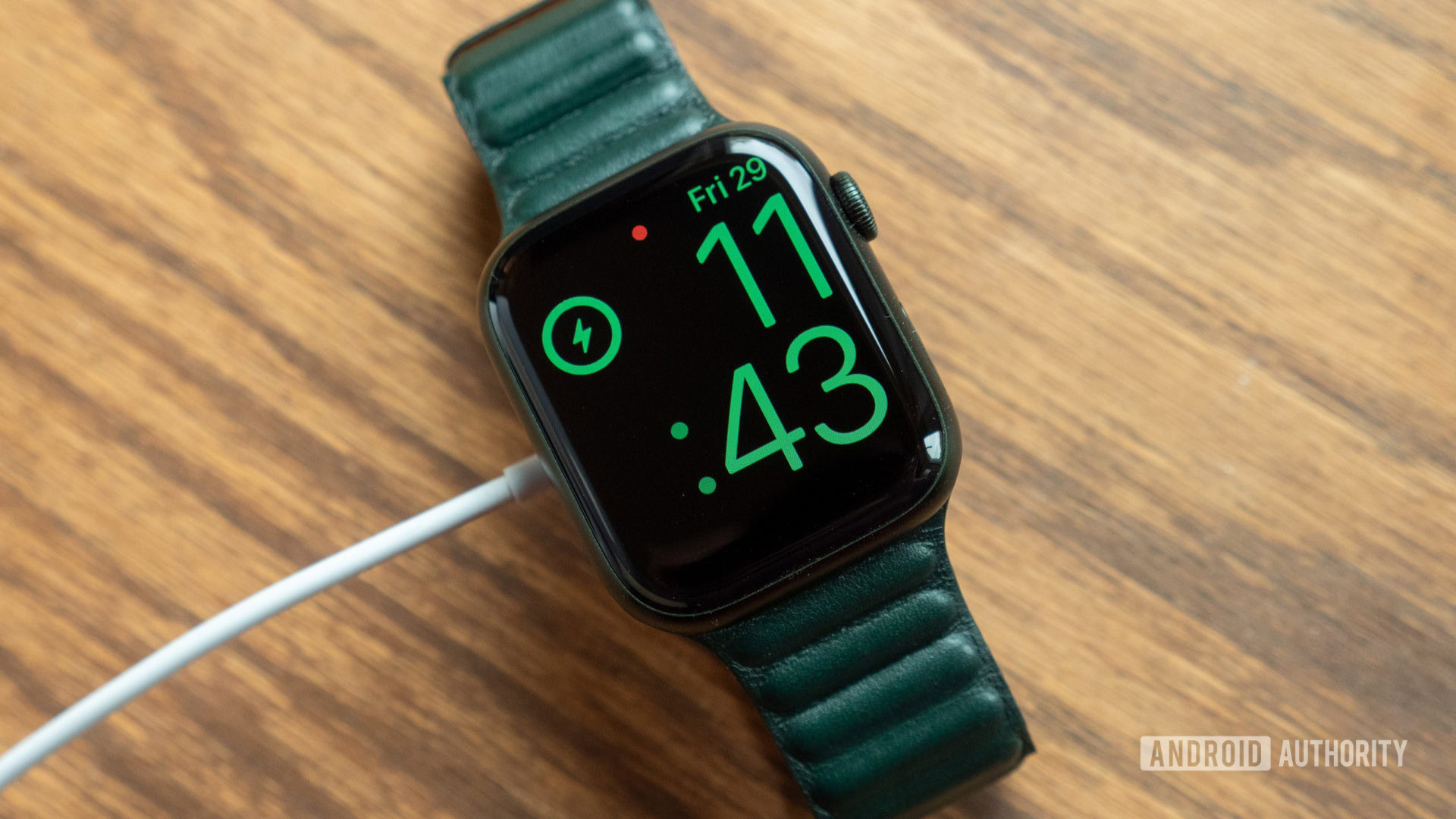
Moving underneath the external design, the Series 7 received virtually no internal hardware upgrades. The watch is powered by the Apple S7 chip, which is based on the same CPU architecture found in the Series 6’s S6 chipset. Apple estimates performance between the two SoCs is about the same, although the S7 boasts a few battery-improving tweaks to compensate for the Series 7’s larger display.
I had no issues with performance throughout the testing period. Opening and switching between apps, summoning Siri, and navigating with Google Maps were all smooth as can be.
Unfortunately, one of the major pain points for Apple Watch users is still nearly unchanged from the Series 6. The Series 7 Apple Watch’s battery life will last you a little more than a day, or about 18 hours of usage. Between notifications, the occasional Siri query, and working out, you’ll probably find yourself throwing the watch on its charger for a few minutes before you go to bed. Luckily, Apple now offers Low Power Mode to help users eke out more use between charges. This setting arrived with watchOS 9 and is available to all devices Apple Watch series 4 or newer.
Charging also doesn’t take as long anymore. The Series 7 charges 33% faster than its predecessor, thanks to its (included) magnetic fast-charging USB-C cable. (A charging brick is not included, so you’ll need to buy one yourself.) The cable will get you from 0-80% in about 45 minutes. Also, if your battery is dead and you’d like to use the watch for sleep tracking, just eight minutes on the charger gets you enough battery life for eight hours of sleep. That’s pretty good! Although I’m sure if you asked Apple Watch users, they’d ask for a larger, longer-lasting battery rather than a faster-charging battery.
Health and fitness tracking: Still one of the best

Aside from what we already talked about in the design section, Apple did not add any hardware sensor upgrades to the Apple Watch Series 7. So, you can expect similar results from its GPS and various other sensors we tested with the Series 6. But this wouldn’t be much of a review if we didn’t test those things, right?
Before we get too ahead of ourselves, the Apple Watch Series 7 can track all of the activity metrics we’ve come to expect: steps, calories, distance, floors climbed, resting and active heart rate, sleep, VO2 max, blood oxygen saturation, sinus rhythm, and menstrual cycles. If you’re after the complete list, check out our dedicated Apple Watch guide for more.
I tested the Apple Watch Series 7’s GPS against the Garmin Fenix 6 Pro and Samsung Galaxy Watch 4. For this run, it was a partly cloudy day in my neighborhood, and I made sure to go through problem areas with heavier tree coverage and under bridges.
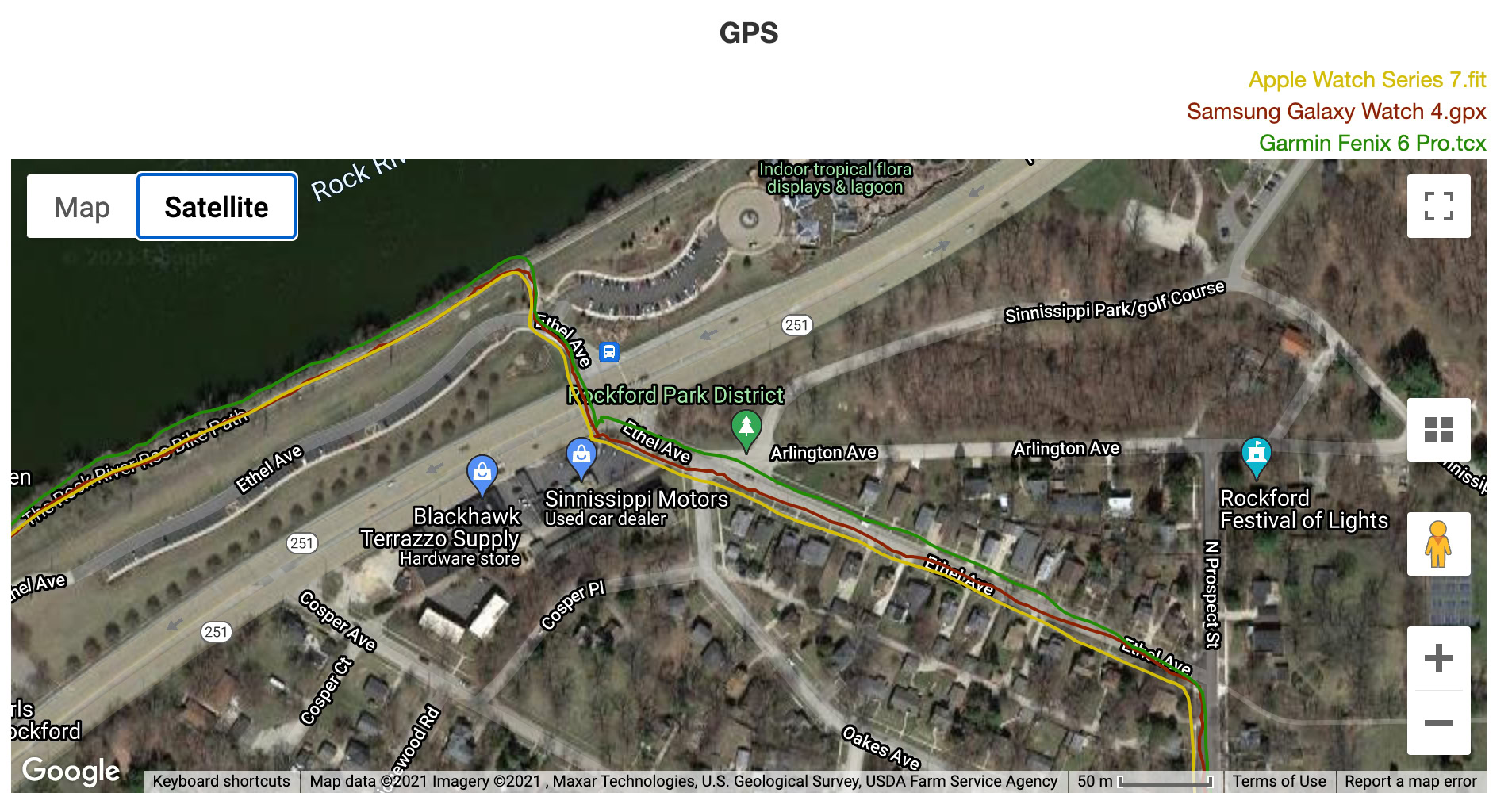
The Apple Watch was the most accurate wearable out of the bunch in many situations, but it wasn’t perfect. Towards the top of the above image, near the northwest side of Ethel Ave., the Galaxy Watch 4 stuck to my route more accurately than the Apple Watch and Fenix 6 Pro. I was indeed running on the left side of the road — which the Garmin didn’t even attempt to comprehend — but the Apple Watch was running a bit too much into the houses for my liking. Once I crossed the street and ran by the river, the Apple Watch and Galaxy Watch lined up and became a little more accurate.
Below is a screenshot from the same run, only through an area with heavy tree coverage. I ran in a straight line, and the Apple Watch was able to report that accurately, while the Galaxy Watch 4 and Fenix 6 Pro were all over the place.
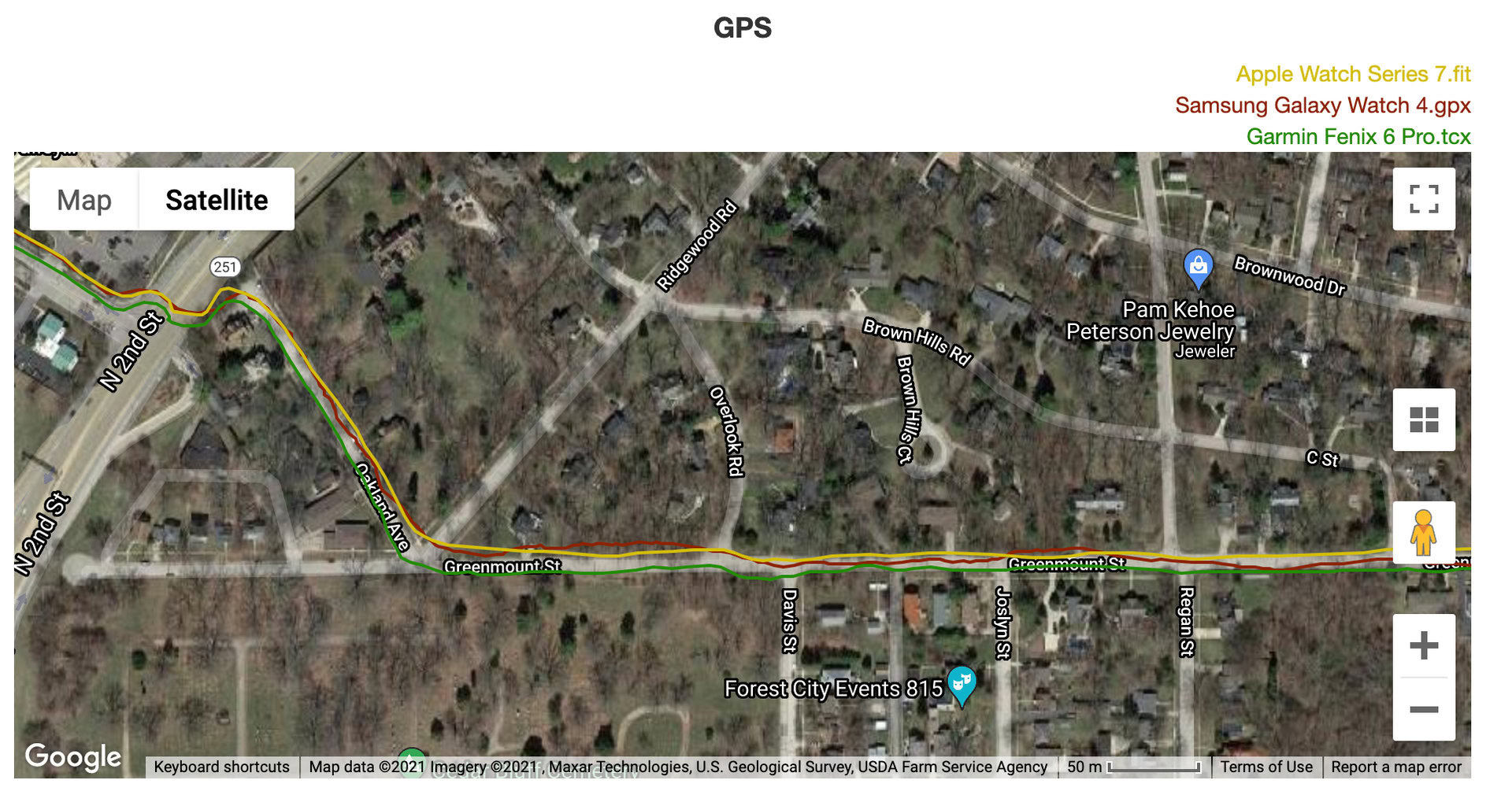
Before we start analyzing heart rate data, I should let you know that I have had some serious problems with the Apple Watch Series 7’s heart rate sensor. Out of the box, the Series 7 would only sporadically record my heart rate during workouts. I tested it multiple times, dug into the settings, checked for software updates, and finally resorted to a full factory data reset.
The problem persisted, unfortunately, so I took to Twitter and called on other fitness-minded journalists who have tested the Apple Watch Series 7. Some other reviewers said they’ve had issues with it, too.
Anyone else with an #applewatchseries7 having an extremely hard time with the heart rate sensor? I’ve never had this many issues with an Apple Watch.— Jimmy Westenberg (@jimmywestenberg) November 2, 2021
The issue with my unit, specifically, is that it would lose my heart rate for a few seconds, find it again, then jump to that point without attempting to correct for any lacking data between the two points. (See the tweet attached above to see what I mean.) I took the Series 7 out on multiple runs and bike rides alongside the Garmin Fenix 6 Pro, and more often than not, the Series 7 would be searching for my heart rate while the Fenix 6 would be recording it with no issue.
This was a new experience for me. Usually, Apple Watch heart rate sensors are some of the most accurate you can buy.
I was able to get some decent data out of the sensor, but only during an indoor cycling workout. Below, you’ll see a ~43-minute cycling workout with the Apple Watch Series 7 and Garmin Fenix 6 Pro strapped to my wrists, while the Polar H10 was strapped to my chest and broadcasting to a Garmin Venu 2. Take a look:

That’s how all of my exercises should look. The Apple Watch Series 7 is spot-on with the Polar H10 at nearly all points, save for a few deviations at the 2:30 and 16-minute sections. Below is the same workout, just zoomed in so we can see exactly how each of the watches compare to the chest strap.

Overall, I’m very happy with the Series 7’s performance here. It caught all of the major peaks and valleys of the workout. Now, if it could only do that every time, we’d be in a good spot.
We purchased a second Apple Watch Series 7 to see if we could get better data out of a different unit and rule out any one-off faults with the hardware. I had varying success with the replacement unit. Below is a 27-minute yoga session recorded with the second Series 7 and Polar H10.
We can't recommend the Apple Watch Series 7's heart rate sensor for anything but general fitness tracking.
The Apple Watch is looking better here, though it’s not perfect. After it caught on initially, it stuck to the H10’s readings very closely until around the seven minute mark, where it dropped out entirely for about 30 seconds. The same thing happened at the ~12-minute mark, only for a shorter duration. These two phenomenons are marked by the big red arrows in the screenshot.

Overall, I like the Apple Watch’s data in this yoga session, but I’ve found the drop-outs to be more common with the Series 7 than any other device I’ve tested over the last month. That includes the Series 6, Galaxy Watch 4, Fenix 6 Pro, and Polar H10.
Finally, I went on one more outdoor run to test the Series 7 against the Polar H10. The Series 7 was able to track my general heart rate patterns, but most of the time it was off doing its own thing. See the screenshot below for the details.

It’s not uncommon for Apple Watches to initially experience some issues with heart rate tracking. Apple may just need to tweak its algorithms a bit over time to dial things in. I hope that’s what’s happening here, at least. For now, I can’t recommend the Apple Watch Series 7’s heart rate sensor for anything but general fitness tracking. It’s just been too unreliable in my experience so far.
Active heart rate data is usually harder to track than resting heart rate, and the Apple Watch Series 7 reported accurate numbers compared to the Polar H10, Garmin Fenix 6 Pro, and a fingertip pulse oximeter. All four devices were able to report similar numbers during multiple sedentary periods over the last few weeks.
Apple Watches can also now automatically detect cycling workouts. My Apple Watch Series 7 review unit was able to recognize that I was cycling outdoors a few minutes into the exercise. If you forget to start your activity, the Series 7 seems reliable enough to start an activity for you each time. However, like most workouts, you’ll probably just want to start your workout manually so you don’t miss out on any precious workout data.
Another software improvement brought fall detection to workouts. For instance, if something happens during a bike ride and you find yourself crashed on the ground, your Apple Watch can notify your emergency contacts. Finally, if you’re an e-bike rider, the Apple Watch can sense the difference between your e-bike and a mechanical bike and adjust your calorie count accordingly. That way, it won’t look like you burnt too many calories during your e-bike session.
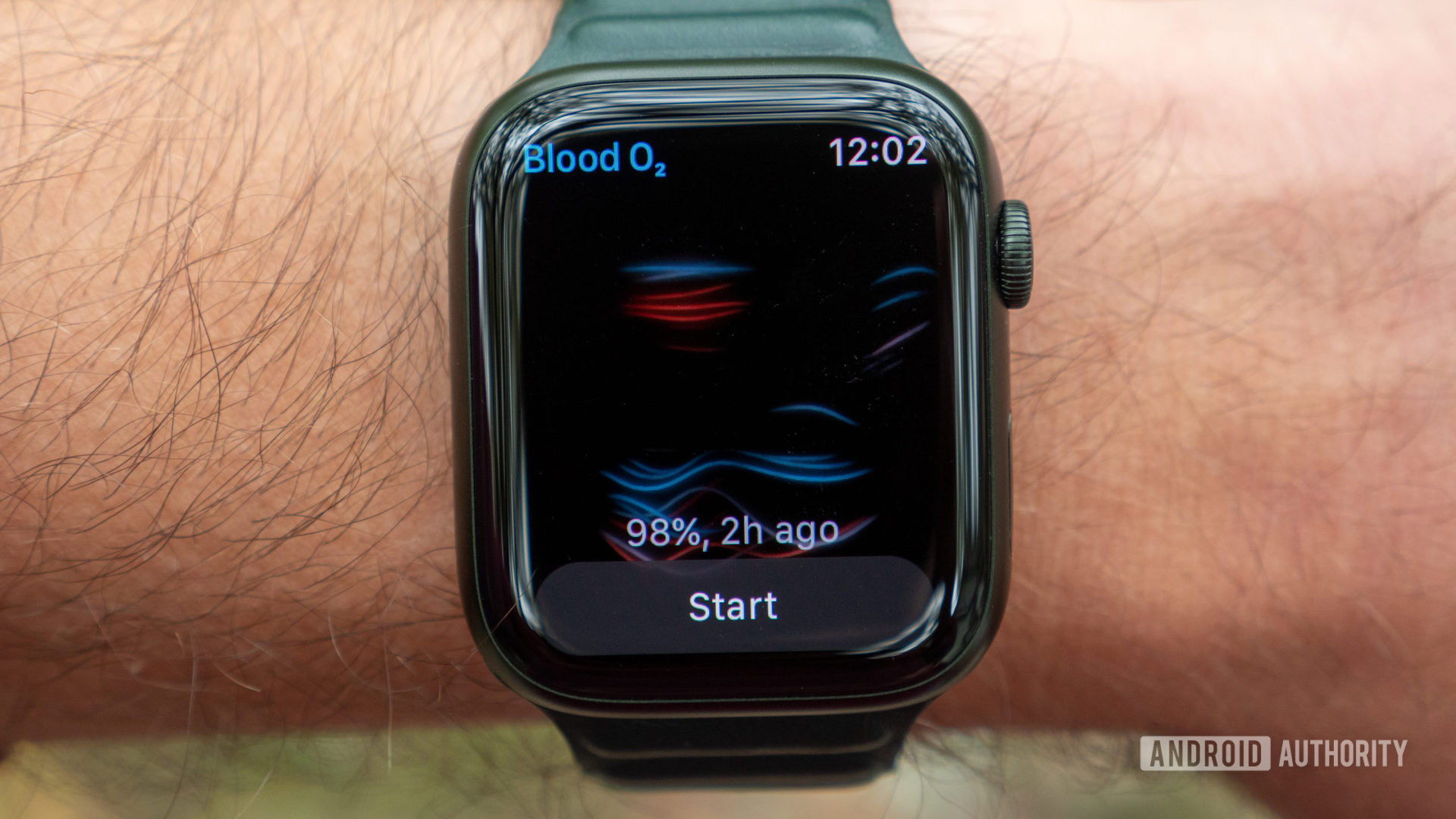
The big news about the Series 6 was the new pulse oximeter, or the ability to track blood oxygen saturation on-demand and throughout the day and night. The sensor is, again, unchanged from the Series 6. SpO2 levels taken with the Apple Watch Series 7 were usually spot on with my trusty fingertip pulse oximeter, Garmin Venu 2, and Withings ScanWatch.
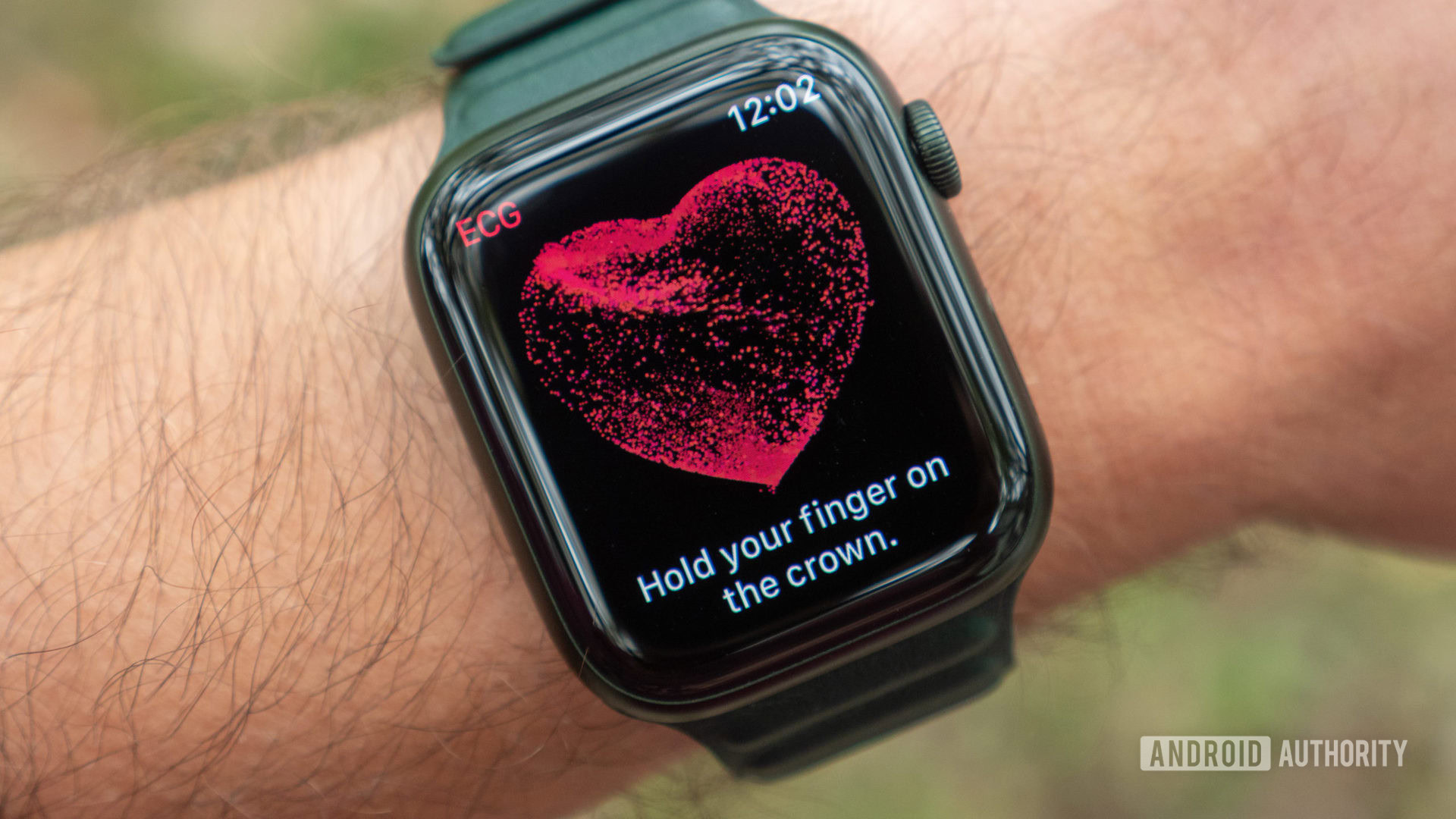
You can also take an electrocardiogram (ECG) with the Apple Watch Series 7. Apple’s ECG app is FDA-approved, so you can rest easy knowing the results you share with your doctor are as accurate as other wrist-worn medical devices. I took ECG tests with the Apple Watch Series 7, Fitbit Sense, and Withings ScanWatch — all within a 1-2 minute period — and all three devices reported normal results.
I don’t often need to worry about heart arrhythmias, but if you do, it’s pretty easy to take an ECG. Just navigate to the ECG app on the watch, place your finger on the Digital Crown for a few seconds, and check out the results in Apple Health.
Native sleep tracking on the Apple Watch has also seen some big improvements. I wouldn’t say Apple has quite caught up to competitors like Fitbit, Garmin, and Withings in sleep-tracking data and recovery features, but it’s getting better.
The Series 7 can track your total time asleep, respiratory and heart rate during sleep, and weekly averages. Thanks to watchOS 9, it can also provide sleep stage tracking (light, deep, REM). Unfortunately, there is still no sleep score. Why is it important that I averaged seven hours and 52 minutes of sleep over the last week? Could that be improved? Tell me! Sleep tracking could certainly use some beefing up. I will say the Apple Watch Series 7 recorded my random nightly bathroom breaks well compared to the data I gathered from the Fitbit Sense.
To make sleep tracking a bit more useful, you can download third-party sleep tracking apps for your Apple Watch if you’d rather get your data from another developer. Sleep tracking is bolstered by all-night blood oxygen monitoring, which is valuable information to have if you’re worried about your oxygen saturation dipping below healthy levels. However, the Series 7’s SpO2 monitor still isn’t certified by the FDA or CE, so it’s unable to warn you of early signs of sleep apnea or other arrhythmias.
Smartwatch features: Niche updates for most Apple Watches
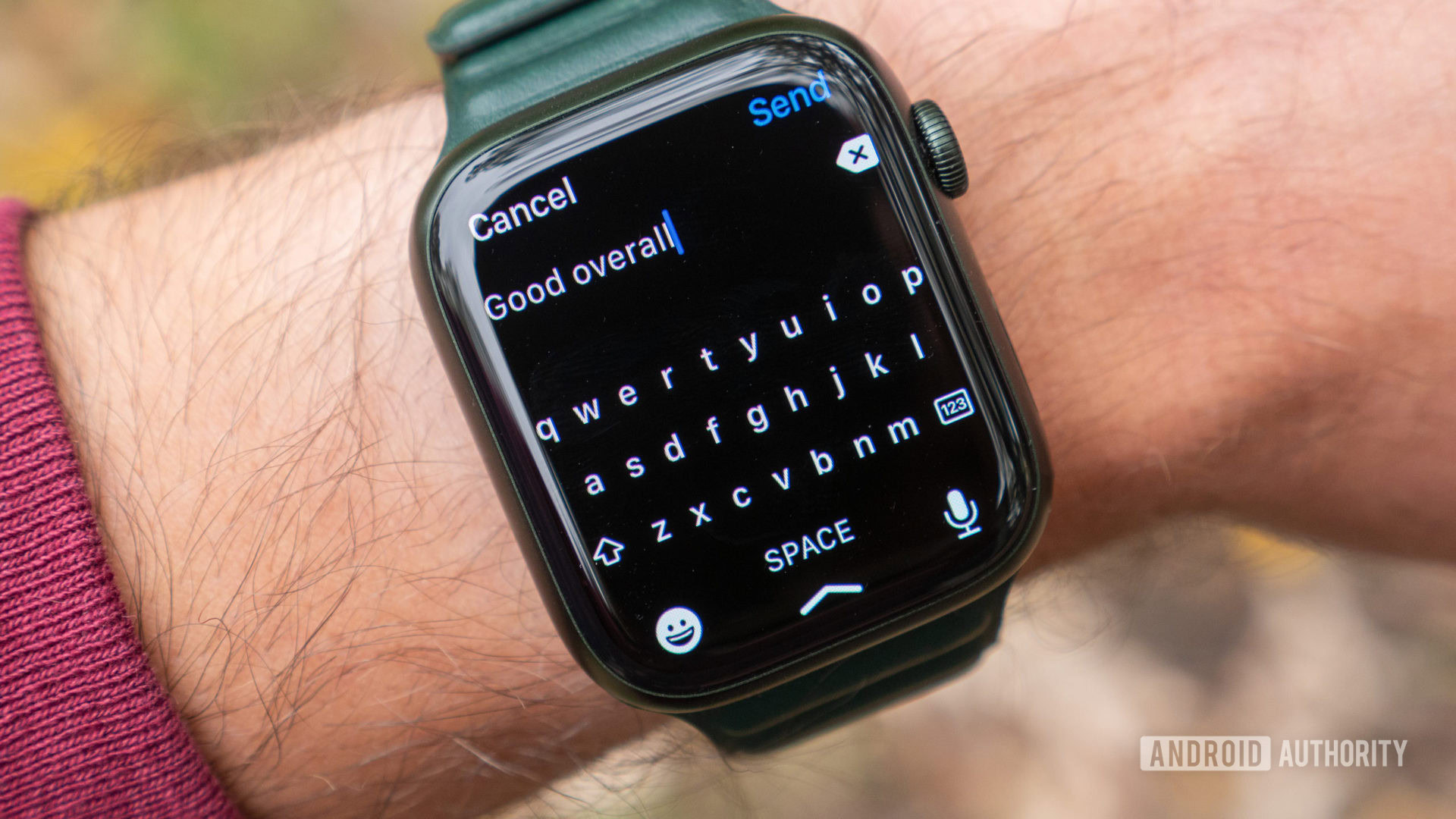
WatchOS 9 is the latest and greatest version of Apple’s smartwatch OS. It’s available to Series 7 owners and every Apple Watch owner using the Series 4 or later. Read our guide to learn how to update an older Apple Watch.
The Series 7 and Series 8 are the only Apple Watches with an on-screen keyboard.
The Series 7 was the first watch to get an on-screen keyboard, a feature exclusive to the Series 7 and Series 8 (likely because of the larger display). While there’s been some controversy around it, the keyboard works well in a pinch when you need to respond to a message from your wrist. It’s quite a lot faster than drawing out each letter with the Scribble method. You can swipe on the keyboard to write out full words or type normally with your big ol’ fingers. I’ve found the keyboard to be accurate with both typing methods. Even so, voice-to-text will still probably be the go-to input method for most users.
At launch, watchOS 8 brought a few improvements to the Apple Watch line. Users can record Pilates and Tai Chi workouts from their wrist. The former is powered by a new algorithm that tracks your core strength, posture, balance, and flexibility. Apple also rebranded the Breathe app to Mindfulness. It feels like an all-new app, though it’s still quite basic. There are two options in the app: Reflect and Breathe.
Reflect has you focus on a simple subject — like solving one basic problem or thinking about someone you’re going to see today — for one minute, in hopes that you’ll feel more focused and aware of that subject after the session is complete. Trippy, colorful animations are shown on the display to help you visualize your thoughts. I think it works well enough, though I can’t imagine seeking out this feature if I feel I need to reflect on something during the day.
The Breathe part of the app helps you slow your breathing using on-screen visual guides. This is nearly unchanged from previous versions of the Breathe app.
Apple Health will now track your mindful minutes, which you can earn by using the Breathe and Reflect features in the Mindfulness app. Apple also records your resting heart rate during these periods so you can see just how much calmer you become over time.
There are lots of smaller, quality-of-life improvements added via software updates. Some of the below features arrived when the device launched, while others were added via watchOS 9. Let’s quickly run through them:
- Messages and Mail apps: You can share photos and GIFs to the Messages and Mail apps from your wrist.
- Messages app: When typing out a message, you can use the Digital Crown to scroll to the exact point in your text that you need to place the cursor.
- Wallet app: Thanks to the Series 7’s ultra-wideband (UWB) tech, your compatible vehicle can sense when you’re near your car, allowing you to perform actions like locking or unlocking your doors from a distance. You’ll need a digital car key stored in the Wallet app for this to work, of course. You can also store a digital key to your home in the Wallet app if you own a compatible smart lock.
- Focus mode: Focus mode works in conjunction with your iPhone — if you enter Focus mode on your iPhone, it’ll set on your watch, too. An indicator will show up by your name in the Messages app, showing everyone that you’re silencing notifications at the moment. Focus mode is also more context-aware. It’ll prompt you to activate the mode when you start a workout, for instance.
- Home app: When you open the Home app on your watch, the current status of all your smart home devices is displayed at the top of the app. It’s a small improvement, but a useful one. The Home app can also send you helpful suggestions based on certain scenarios involving your connected devices. If, for instance, your smart doorbell rings, the Home app might suggest unlocking the door or turning on the entry lights.
- Multisport mode: For triathletes, the Multisport mode allows users to seamlessly switch between activities within a single workout.
- Added workout views and data: WatchOS 9 also brought new customizable workout views to user’s wrists plus more detailed metrics for runners and swimmers.
- Cardio Recovery: Users can now monitor their recovery post-workout.
- New health tools: Medication Reminders and aFib History make the Apple Watch a more powerful wellness companion than ever before.
WatchOS 9 on the Apple Watch Series 7 works splendidly and brought a ton of new features to the line. Learn more about what else you can now find on your device in the latest software here. I’ve noticed zero software issues throughout the testing period. Just remember, most of these changes have also made their way to older Apple Watches.
Compared to other smartwatch platforms, the Apple Watch is still regarded as the gold standard for software support. It receives regular software updates every year, with new features, bug fixes, and performance enhancements. Most of the apps you have on your iPhone are available on the Apple Watch, too.
WatchOS 9 is a nice update to the already feature-rich OS, though most of its features aren't exclusive to the Series 7.
Overall, the Apple Watch provides an excellent software experience. There are times when Apple’s walled garden can get in the way, like the fact that there are still no third-party watch faces, but it’s easy to overlook watchOS’ faults when considering the platform’s other strengths.
Value and competition


The Apple Watch Series 7 is a premium smartwatch and is priced as such. $400 is the usual starting price of Apple’s flagship smartwatches, so nothing has changed there but as this isn’t the latest model, it can be found for much less. That’s a steal when you consider this is still a very powerful device with only a few features missing compared to the full-priced Series 8.
The biggest Apple Watch Series 7 competitor in the Apple ecosystem is of course its newer sibling. Besides being the latest and greatest, the Series 8 ($329 at Amazon) adds a few key improvements, including a brand-new temperature sensor. The sensor offers deeper sleep insights and can be leveraged to retroactively predict ovulation windows for those who menstruate. The Series 8 also offers Crash Detection, an impressive new safety feature.
Apple also recently launched the Apple Watch SE 2 ($269.99 at Amazon). Even cheaper than the original SE, the SE 2 offers tremendous value. It has many of the same features as the Series 7 but lacks ECG and SpO2 sensors, which the average user might not care about anyway.
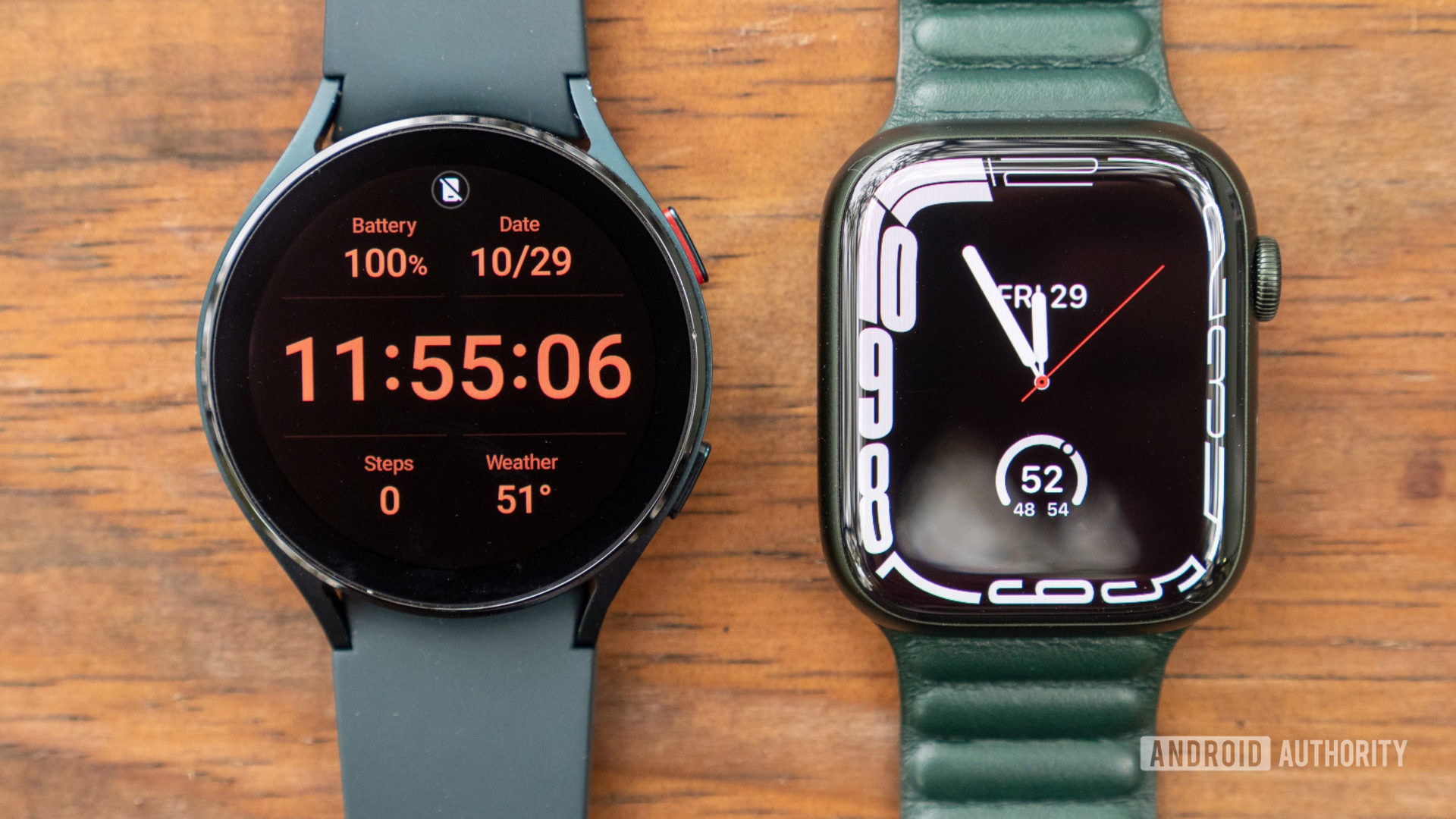
If you’re able to switch to the Android ecosystem, the Samsung Galaxy Watch 5 ($162.57 at Amazon) and Galaxy Watch 5 Pro ($374 at Amazon) are the best smartwatches you can buy on the platform. They both run the latest Wear OS update, they’re both solid fitness devices, and we’ve found both devices’ battery life to be a bit better than the Series 7.
The Garmin Venu 2 Plus ($449 at Amazon) is a solid Apple Watch Series 7 alternative, especially for the sports-focused crowd. Garmin’s latest multisport watch has a bright OLED display, accurate fitness tracking, onboard music storage, and plenty of smartwatch features — especially if you use Android. Just be willing to pay up.
Apple Watch Series 7 review: The verdict
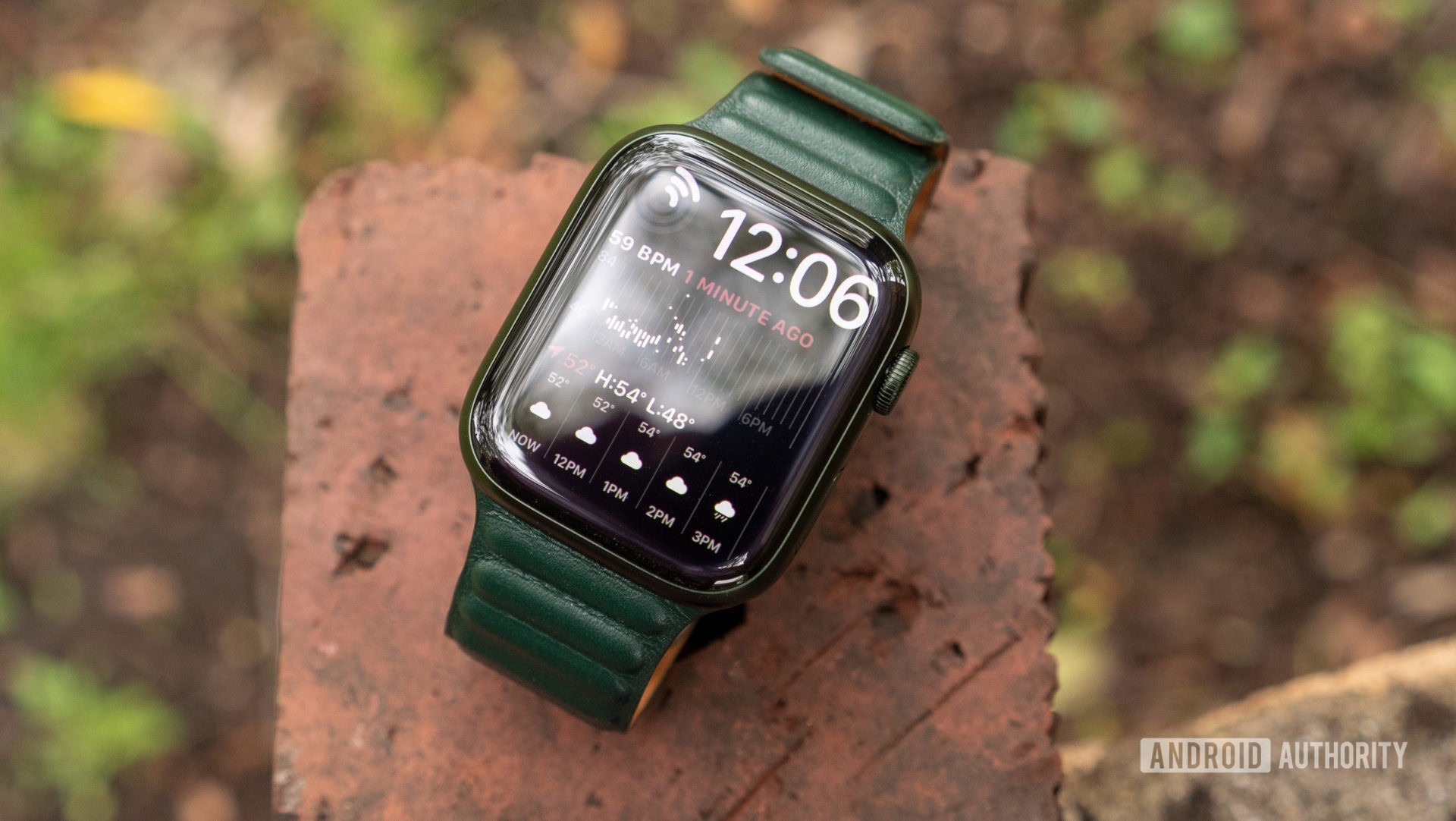
The Apple Watch Series 7 is a very good smartwatch. So was the Series 6, and so was the Series 5. Apple has a winning formula, and it’s clear the company is comfortable putting out new devices with minuscule updates. This isn’t much of an upgrade over the previous watch and not a huge downgrade from the Series 8. It’s a really safe purchase at a good price.
If you need to upgrade to the Series 7, you'll find a lot to like. But if your current Apple Watch works well, there's little reason to upgrade.
If your current Apple Watch is working well for you, I don’t think you should upgrade to the Series 7. Series 6, Series 5, and even Series 4 users can hold onto their devices and get a similar experience or jump further forward and opt for the Series 8. However, if your smartwatch’s battery is waning, if the screen has a crack, or if you have the Series 3, you’ll find a lot to like in the Apple Watch Series 7 thanks to its improved value.
Thank you for being part of our community. Read our Comment Policy before posting.